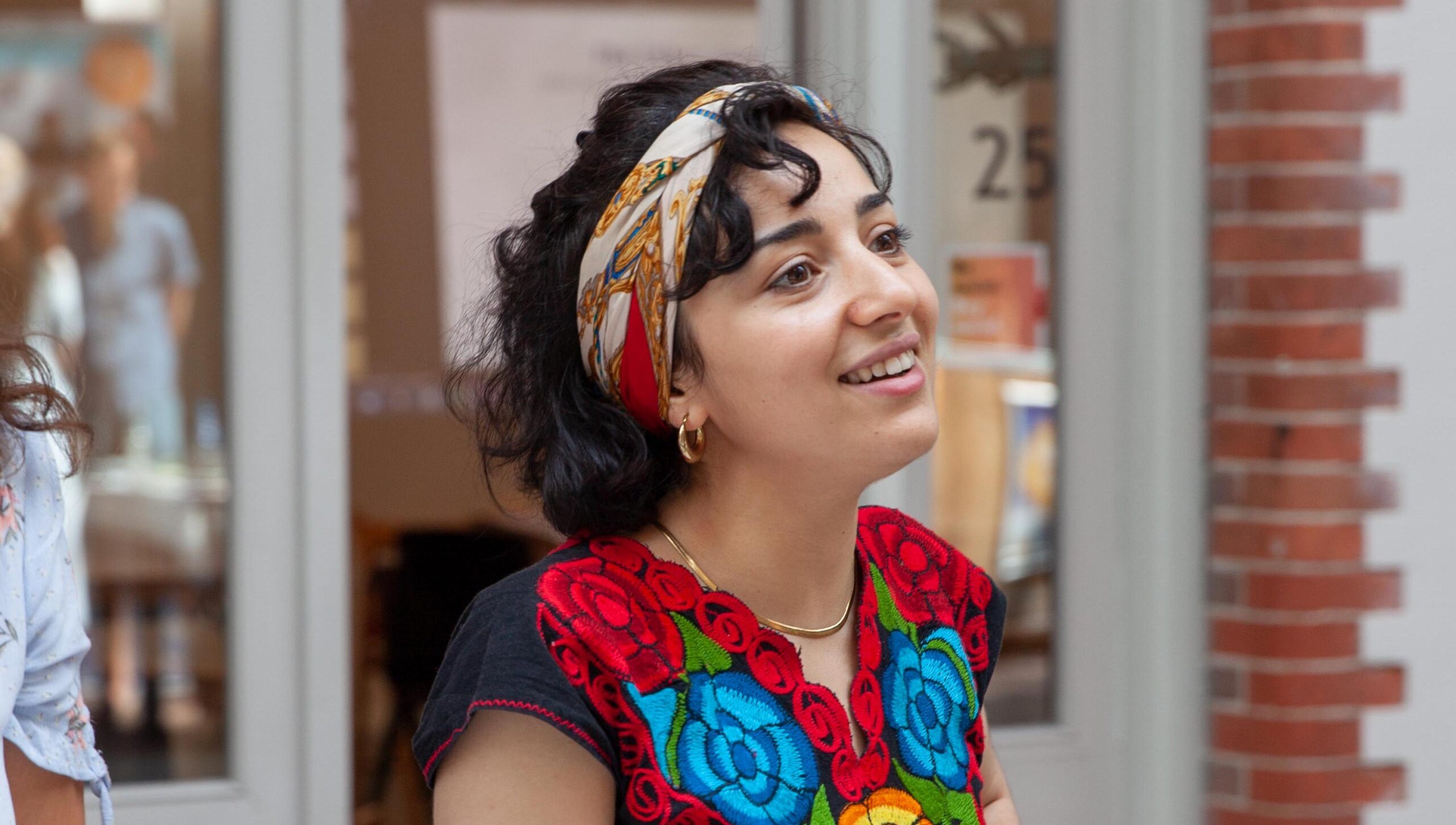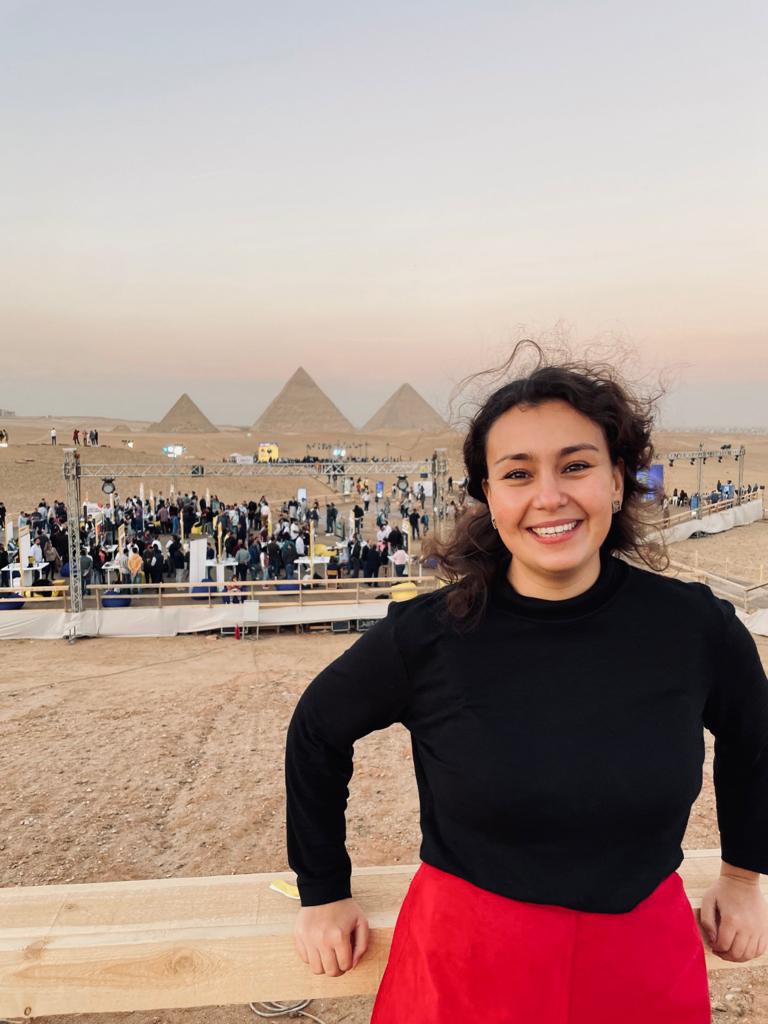Safae likes to move around. While studying Arabic, she lived in Egypt for a while, and then spent a few more years in Tunisia and France. In the meantime, she had already started at Taalhuis in 2018 as an Egyptian Arabic (Masri) and Modern Standard Arabic teacher, and when she returned, she also started teaching Dutch and Moroccan Arabic (Darija).
She’s only been teaching Darija to private students lately, but this dialect is now so popular that another group course will start in September – and maybe even two. Online from Rabat, where she will live for six months from then on.
Quite to the purpose actually, to teach Darija from the country where it is spoken.
Yes! In September I will start with an A1.1 group, and maybe even an A1.2, for students who can already do a little more. In fall, my private students also come to visit me in Rabat. I’ve told them a lot about the north of the country and can’t wait to do a little road trip with them. Who knows if we can make a trip with a larger group sometime!
Do you like living in different places?
When I lived in Cairo in 2017, I enjoyed it so much that I wanted to do it more often. So when I finished that study I went to Tunis for half a year, and then studied and worked in Paris for a year. And now I’m on the road again, first to Rabat and then hopefully to Santa Cruz in the US.
What are you going to do in the US?
I’ve been doing a PhD in political philosophy since September, and my dissertation is on prisons and prison abolition. There are many abolitionists on the west coast of the US, and at the University of California, there are a lot of people who are experts in this field and do activist work. There’s one professor I really like, Banu Bargu, who wrote a book about hunger strikes in high security prisons in Turkey.
How do you find teaching all those different Arabic dialects – and Dutch? Are those courses very different from each other?
It doesn’t differ that much in terms of people, because Taalhuis attracts certain types: people who are enthusiastic about immediately speaking in the target language and who enjoy doing activities outside of the classroom. They are often very proactive too.
And as far as method is concerned, the biggest difference is of course that Dutch students actually hear the language they are learning around them. It is more difficult with a foreign language. But the nice thing about Darija is that it is spoken a lot in Amsterdam.
It is widely spoken in major European cities, in Amsterdam-West you’ll hear it all the time. Although people who speak Darija in Amsterdam are mainly of Riffian origin, while in Paris more Moroccans live from the south or the centre of Morocco – Casablanca, Rabat and so on. But you do hear it a lot, at least more than other Arabic dialects, such as Levantine and Egyptian.
And you’ll also hear Tamazight (Berber) a lot around here, I can imagine?
Certainly. Unfortunately I don’t speak it myself, so I would love it if Taalhuis would also offer that.
Why do people usually learn Darija?
For all kinds of reasons: they have a partner of Moroccan origin, Moroccan parents, or often work together with people who speak Darija. That can also be people from Algeria or Tunisia, they also speak it there. The variants from Algeria and Morocco are especially close to each other. But there can also be regional differences within a country, or differences between urban and rural areas.
What are the main differences between Darija and other dialects such as Levantine and Egyptian?
With Darija you swallow the vowels more, they are very short. Actually a kind of uh sounds. Instead of katab (‘write’), we say something that sounds more like kteb. That E is actually there because you can’t have three consonants next to each other, and it doesn’t really sound like a vowel; rather, they all seem to be consonants stuck together. That makes it sometimes difficult for people who speak a different dialect to understand Darija. And we talk very fast, but well, Egyptians actually do that too.
Darija is also an interesting mix of many languages, with influences from Tamazight, Spanish and French. And if a language is not standardised, people also feel free to experiment. As a result, you also come across many foreign words that have been put into Arabic via the verb conjugation: ka-tbukini (‘you read’), for example, comes from the French bouquin (an informal word for ‘book’).
Do the differences sometimes cause confusion?
A classic example of this is 3ayyat, which means “to call” in Darija, but “to cry” in Egyptian. So “I call” and “I cry” just sound the same.
When do you actually speak Darija yourself?
We always spoke it at home, and with friends it is often a mix of French, English and Darija. And when I go to a shop where I know the owner is Moroccan, I also automatically speak Darija. I also try to go to Morocco every year, as most of my family lives there.
What do you like most about teaching?
I really like it when learning a language also becomes personal for the students, that it feels safe and warm enough to talk freely about their own lives. And I like leaving the classroom: we recently went to The Blue Caftan in Rialto, for example, and then you notice how much fun students enjoy using the language outside the usual context of the language school. And eating together or going to concerts, I usually do those kinds of things at the end of a course. Recently, for example, we went to see Nawal El Zoghby in the Concertgebouw.
But it can be anything: if someone has an idea, they just share it in the whatsapp group. You notice in the lessons that it is very relaxed, and that the language really comes to life. You don’t get all the input from the book, but you also improvise more and talk about things that play a lot more in your own life. Or about books you read, movies you see, podcasts, the news, etcetera.
Sometimes I also bring several levels together. Then you can learn from each other, but also motivate each other. Because when you’re at a lower level and you meet someone who didn’t speak a word of Darija a year ago, but can now have whole conversations, you think: I can achieve that too.
Thank you!
Interview by Dutch teacher Yoran.


